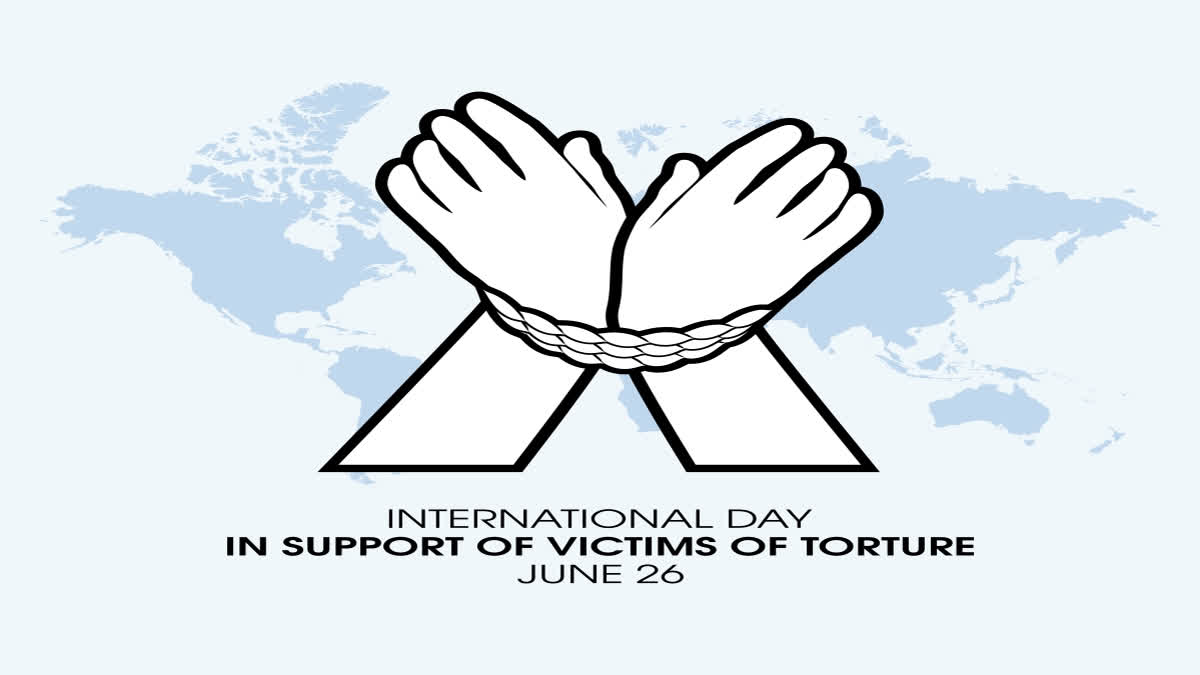What is Torture?Torture is a vile act of punishing someone and making them suffer. According to Human Rights Court, torture is a ‘deliberate inhuman treatment causing very serious and cruel suffering’. The UN strictly condemned such acts and considered them as a crime against humanity.
While international law prohibits the use of torture, many countries still use methods of torture. Some of the countries where torture is most common include: Sri Lanka, Iran, Afghanistan, Eritrea, Democratic Republic of Congo, Sudan, Ethiopia, Iraq, Turkey, and Syria.
Torture has the aim and consequence of profoundly damaging a person’s physical and mental health, their identity, and their socio-economic relationships with family and community.
History:On December 12, 1997, by resolution 52/149, the UN General Assembly proclaimed 26 June the United Nations International Day in Support of Victims of Torture. June 26 is an opportunity to call on all stakeholders including UN Member States, civil society and individuals everywhere to unite in support of the hundreds of thousands of people around the world who have been victims of torture and those who are still tortured today.
According to the UN Secretary-General Antonio Guterres "Torturers must never be allowed to get away with their crimes, and systems that enable torture should be dismantled or transformed."
Why mark June 26?The UN International Day in Support of Victims of Torture on June 26 marks the moment in 1987 when the UN Convention Against Torture and Other Cruel, Inhuman or Degrading Treatment or Punishment, one of the key instruments in fighting torture, came into effect.
Purpose of the day:The goal of the day is the total elimination of torture and the effective implementation of the Convention against Torture and Other Cruel, Inhuman or Degrading Treatment or Punishment. On June 26, 1998, the United Nations called for all governments, stakeholders, and members of global society to take action against perpetrators across the globe.
The primary aim of this day is to eradicate this inhumane practice in all its forms. Torture is a serious global issue, and this day serves as a crucial reminder that it continues to happened around the world. Torture leaves both physical and psychological scars. This day highlights the ongoing need for: Medical psychological support for survivors and programs to help victims rebuilt their lives.
Torture can be — Mental or physical or a combination of both. Physical assaults include beatings, prolonged enforced standing, hanging, suffocation, burnings, electric shock, sexual assault and rape, and exposure to extreme heat or cold. Psychological Torture included verbal abuses, threats, false accusations, forced choices, mock executions, and being forced to witness torture, mutilation and murder of others.
Survivors of torture and trauma can have ongoing problems including:
- Inability to trust others
- Inability to form close relationships
- Anxiety disorders, such as phobias or panic attacks
- Severe depression, insomnia, memory loss, fatigue and post-traumatic stress disorder (PTSD)
- Problem with concentrating
- Problems with alcohol or drug abuse
- Survivors relive these near-death experiences in their nightmares or flashbacks
- Some survivors of torture and trauma live with their memories for years, or even for the rest of their lives
Long-term physical effects of torture include scars, headaches, musculoskeletal pains, foot pains, hearing loss, dental pain, visual problems, abdominal pains, cardiovascular/respiratory problems, sexual difficulties and neurological damage.
Healing through rehabilitation:Without healing, most survivors cannot recover the physical and mental life they had before torture. The UN Voluntary Fund for Victims of Torture, administered by the UN Human Rights Office in Geneva is a unique victim-focused mechanism that channels funding for the assistance to victims of torture and their families. The work of rehabilitation centres and organisations around the world has demonstrated that victims can make the transition from horror to healing.
Torture in India:India has not ratified the Convention against Torture and Other Cruel, Inhuman or Degrading Treatment or Punishment, but has signed the Convention on October 14, 1997. A draft Bill against torture is in consideration by the government.
Torture is not criminalised in law as a separate or special offense. Provisions in the Indian Penal Code, 1860 (sections 330 & 348) penalises acts that can also be considered as torture, with seven and three years of imprisonment respectively if proven guilty. However, the offense attracts no particular relevance if the crime is committed by a police officer.
